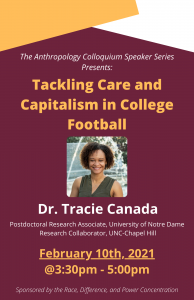Events
Spring 2023 Events
February 24, Begin Within: Designing Classrooms for Healing, Love, and Liberation
Dr. Michelle Chatman, Assistant Professor in the Crime, Justice, and Security Studies program at the University of the District of Columbia (UDC)
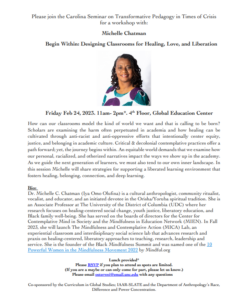 Dr. Michelle C. Chatman (Iya Omo Olufina) is a cultural anthropologist, community ritualist, vocalist, and educator, and an initiated devotee in the Orisha/Yoruba spiritual tradition. She is an Associate Professor at The University of the District of Columbia (UDC) where her research focuses on healing-centered social change, youth justice, liberatory education, and Black family well-being. She has served on the boards of directors for the Center for Contemplative Mind in Society and the Mindfulness in Education Network (MIEN). In Fall 2023, she will launch The Mindfulness and Contemplative Action (MICA) Lab, an experiential classroom and interdisiplinary social science lab that advances research and praxis on healing-centered, liberatory approaches to teaching, research, leadership and service. She is the founder of the Black Mindfulness Summit and was named one of the 10 Powerful Women in the Mindfulness Movement 2022 by Mindful.org
Dr. Michelle C. Chatman (Iya Omo Olufina) is a cultural anthropologist, community ritualist, vocalist, and educator, and an initiated devotee in the Orisha/Yoruba spiritual tradition. She is an Associate Professor at The University of the District of Columbia (UDC) where her research focuses on healing-centered social change, youth justice, liberatory education, and Black family well-being. She has served on the boards of directors for the Center for Contemplative Mind in Society and the Mindfulness in Education Network (MIEN). In Fall 2023, she will launch The Mindfulness and Contemplative Action (MICA) Lab, an experiential classroom and interdisiplinary social science lab that advances research and praxis on healing-centered, liberatory approaches to teaching, research, leadership and service. She is the founder of the Black Mindfulness Summit and was named one of the 10 Powerful Women in the Mindfulness Movement 2022 by Mindful.org
March 6th and 29th, Anti-Racist Pedagogy Reading Circle
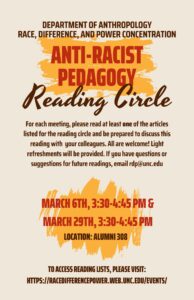 For each meeting, please read at least one of the articles listed below for the reading circle and be prepared to discuss this reading with your colleagues. All are welcome! Light refreshments will be provided. If you have any questions of suggestions for future readings, please email rdp@unc.edu.
For each meeting, please read at least one of the articles listed below for the reading circle and be prepared to discuss this reading with your colleagues. All are welcome! Light refreshments will be provided. If you have any questions of suggestions for future readings, please email rdp@unc.edu.
March 6th readings:
-
-
- Diallo, Oda-Kange and Nico Miskow Friborg. 2021. Subverting the white cis gaze: Towards a pedagogy of discomfort, accountability, and care in the anthropology classroom. Teaching Anthropology 10(4): 17-35.
- Williams, Bianca, 2016. Radical honesty: Truth-telling as pedagogy for working through shame in academic spaces. Race, equity, and the learning environment: The global relevance of critical and inclusive pedagogies in higher education, pp.71-82. ***email cayla@live.unc.edu for PDF
-
March 29th readings:
-
-
- Adsit, Janelle. 2022. Pursuing Antiracist and Anticolonial Approaches to Contemplative Practices. In Contemplative Practices and Anti-Oppressive Pedagogies for Higher Education, ed. Greta Gaard and Bengu Erguner-Tekinalp. London: Routledge.
- Cobb, Hannah and Karina Croucher. 2022. Assembling wellbeing in archaeological teaching and learning. In Archaeology, Heritage, and Wellbeing, ed. Paul Everill and Karen Burnell. London: Routledge.
-
Supplemental resources for your consideration:
-
-
- The Anti-Racist Pedagogy Discussion Guide. https://sph.unc.edu/wp-content/uploads/sites/112/2020/08/Anti_Racist_Discussion_Pedagogy__1.pdf
- Highlander Research and Education Center Methodologies.
-
April 15th, Un-Grading Roundtable
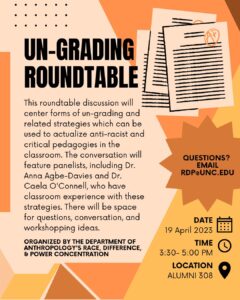 This roundtable discussion will center forms of un-grading and related strategies which can be used to actualize anti-racist and critical pedagogies in the classroom. The conversation will feature panelists, including Dr. Anna Agbe-Davies and Dr. Caela O’Connel, who have classroom experience with these strategies. There will be space for questions, conversation, and workshopping ideas.
This roundtable discussion will center forms of un-grading and related strategies which can be used to actualize anti-racist and critical pedagogies in the classroom. The conversation will feature panelists, including Dr. Anna Agbe-Davies and Dr. Caela O’Connel, who have classroom experience with these strategies. There will be space for questions, conversation, and workshopping ideas.
If you are an instructor or student who has experience with un-grading strategies who would like to participate, please email cayla@live.unc.edu
Fall 2021 Events
December 2nd,
Reclaiming Black Wall Street: Healing Layers of Trauma in Plain Sight
Dr. Alicia Odewale, Assistant Professor of Anthropology, University of Tulsa
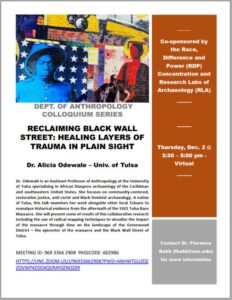 Dr. Odewale is an Assistant Professor of Anthropology at the University of Tulsa specializing in African Diaspora archaeology of the Caribbean and southeastern United States. She focuses on community-centered, restorative justice, anti-racist and Black feminist archaeology. A native of Tulsa, this talk examines her work alongside other local Tulsans to reanalyze historical evidence from the aftermath of the 1921 Tulsa Race Massacre. She will present some of results of this collaborative research including the use of radical mapping techniques to visualize the impact of the massacre through time on the landscape of the Greenwood District – the epicenter of the massacre and the Black Wall Street of Tulsa. Contact Dr. Flroence Babb fbabb[@] unc.edu for more information.
Dr. Odewale is an Assistant Professor of Anthropology at the University of Tulsa specializing in African Diaspora archaeology of the Caribbean and southeastern United States. She focuses on community-centered, restorative justice, anti-racist and Black feminist archaeology. A native of Tulsa, this talk examines her work alongside other local Tulsans to reanalyze historical evidence from the aftermath of the 1921 Tulsa Race Massacre. She will present some of results of this collaborative research including the use of radical mapping techniques to visualize the impact of the massacre through time on the landscape of the Greenwood District – the epicenter of the massacre and the Black Wall Street of Tulsa. Contact Dr. Flroence Babb fbabb[@] unc.edu for more information.
September 29th
Fieldwork in The Times of Covid: A Roundtable Discussion (Virtual)
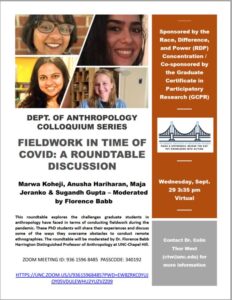 RDP members Anusha Hariharan, Maja Jeranko, Sugandh Gupta, and Marwa Koheji shared their experience of doing doctoral fieldwork in the time of Covid. It was moderated by RDP co-chair Dr. Florence Babb.
RDP members Anusha Hariharan, Maja Jeranko, Sugandh Gupta, and Marwa Koheji shared their experience of doing doctoral fieldwork in the time of Covid. It was moderated by RDP co-chair Dr. Florence Babb.
Previous Events
February 10th, 2021
Anthropology Colloquium Speaker Series Talk by Dr. Tracie Canada
Title: Tacking Care and Capitalism in College Football
Dr. Tracie Canada’s talk follows her research on American Football college athletes as they navigate the precarious politics of race, care, and kinship.
November 2, 2020 RDP Reflects on: “The Case for Letting Anthropology Burn: Race, Racism and its Reckoning in American Anthropology”
Inspired by recent writings and events in anthropology, this panel discussion will be a virtual conversation about the relevance of anthropology for engaging today’s questions of race and racism. The discussion will be initiated by four RDP respondents: Maya Berry (Asst Professor, Dept of African, African American and Diaspora Studies), Ampson Hagan (Graduate Student, Dept of Anthropology), Anusha Hariharan (Graduate Student, Dept of Anthropology), and Donald Nonini (Professor, Dept of Anthropology). Attendees are encouraged to familiarize themselves with a recent webinar, interview, and American Anthropologist article, which have inspired this event and its title.
To attend the virtual event, please go to: https://unc.zoom.us/j/96940127357
October 23rd
From Boas to Black Power: Racism, Liberalism and American Anthropology. Talk by Dr. Mark Anderson (UC-Santa Cruz)
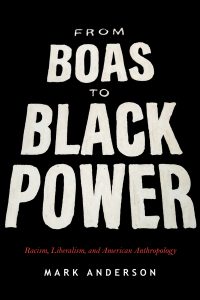 Drawing on the book From Boas to Black Power: Racism, Liberalism, and American Anthropology, this talk explores the tensions and contradictions of the anti-racist liberalism promoted by Franz Boas and his students in the first half of the 20th century and critiqued by anthropologists radicalized by the Black Power and Black Studies movements of the late 60s and early 1970s. The first half of the talk examines paradoxes within the anti-racist thought of Franz Boas and Ruth Benedict, who tacitly reinscribed the normalized whiteness of a U.S. society they sought to reform along racially egalitarian lines. The second half explores the programmatic critiques of anthropology, and its whiteness, produced by William Willis, Diane Lewis, and Charles Valentine. Their works emerged out of a larger struggle led by anthropologists of color who, politically and intellectually inspired by the Black Studies movement, initiated an early, collective effort to decolonize the discipline.
Drawing on the book From Boas to Black Power: Racism, Liberalism, and American Anthropology, this talk explores the tensions and contradictions of the anti-racist liberalism promoted by Franz Boas and his students in the first half of the 20th century and critiqued by anthropologists radicalized by the Black Power and Black Studies movements of the late 60s and early 1970s. The first half of the talk examines paradoxes within the anti-racist thought of Franz Boas and Ruth Benedict, who tacitly reinscribed the normalized whiteness of a U.S. society they sought to reform along racially egalitarian lines. The second half explores the programmatic critiques of anthropology, and its whiteness, produced by William Willis, Diane Lewis, and Charles Valentine. Their works emerged out of a larger struggle led by anthropologists of color who, politically and intellectually inspired by the Black Studies movement, initiated an early, collective effort to decolonize the discipline.
To attend the virtual event, please go to: https://unc.zoom.us/j/95778761439
Co-sponspored by Critical Ethnic Studies and the Institute for the Arts and Humanities.
February 20nd, 2020
SAS Brown Bag with Dr. Joseph Feldman
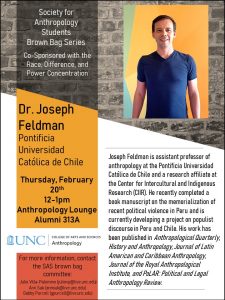 Joseph Feldman is assistant professor of anthropology at the Pontificia Universidad Católica de Chile and a research affiliate at the Center for Intercultural and Indigenous Research (CIIR). He recently completed a book manuscript on the memorialization of recent political violence in Peru and is currently developing a project on populist discourse in Peru and Chile. His work has been published in Anthropological Quarterly, History and Anthropology, Journal of Latin American and Caribbean Anthropology, Journal of the Royal Anthropological Institute, and PoLAR: Political and Legal Anthropology Review.
Joseph Feldman is assistant professor of anthropology at the Pontificia Universidad Católica de Chile and a research affiliate at the Center for Intercultural and Indigenous Research (CIIR). He recently completed a book manuscript on the memorialization of recent political violence in Peru and is currently developing a project on populist discourse in Peru and Chile. His work has been published in Anthropological Quarterly, History and Anthropology, Journal of Latin American and Caribbean Anthropology, Journal of the Royal Anthropological Institute, and PoLAR: Political and Legal Anthropology Review.
November 11th, 2019
Create, Propose, Rehearse: A Preview of AAA Presentations
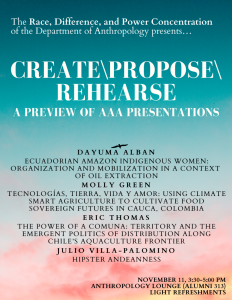 Featuring Anthropology PhD Students:
Featuring Anthropology PhD Students:
Dayuma Alban “Ecuadorian Amazon Indigenous Women: Organization and Mobilization in a Context of Oil Extraction.”
Molly Green “Teconologías, Tierra, Vida y Amor: Using Climate Smart Agriculture to Cultivate Food Sovereign Future in Cauca, Colombia.”
Eric Thomas “The Power of a Comuna: Territory and the Emergent Politics of Distribution Along Chile’s Aquaculture Frontier.”
Julio Villa-Palomino “Hipster Andeanness.”
October 14th, 2019
RDP and GCPR Conversation with Lynn Stephen: Witnessing, Collaboration, and Participatory Research Methodologies
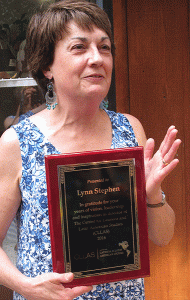 Featuring Lynn Stephen, Philip H. Knight Chair, Distinguished Professor of Arts and Sciences, Professor of Anthropology, and a participating faculty member in Ethnic Studies, Latin American Studies, and Women’s and Gender Studies at the University of Oregon. Her scholarly work centers on the impact of globalization, migration, nationalism and the politics of culture on indigenous communities in the Americas.
Featuring Lynn Stephen, Philip H. Knight Chair, Distinguished Professor of Arts and Sciences, Professor of Anthropology, and a participating faculty member in Ethnic Studies, Latin American Studies, and Women’s and Gender Studies at the University of Oregon. Her scholarly work centers on the impact of globalization, migration, nationalism and the politics of culture on indigenous communities in the Americas.
September 23, 2019
When Mines are like Women and Men are like Mercury: Riddling Human-Environment Relations
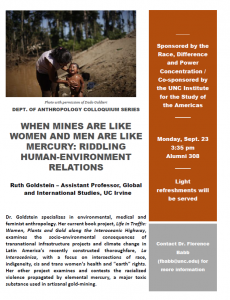 Featuring Ruth Goldstein – Assistant Professor, Global and International Studies, UC Irvine. Dr. Goldstein specializes in environmental, medical and feminist anthropology. Her current book project, Life in Traffic: Women, Plants and Gold along the Interoceanic Highway, examines the socio-environmental consequences of transnational infrastructure projects and climate change in Latin America’s recently constructed thoroughfare, La Interoceánica, with a focus on intersections of race, indigeneity, cis and trans women’s health and “earth” rights. Her other project examines and contests the racialized violence propagated by elemental mercury, a major toxic substance used in artisanal gold-mining.
Featuring Ruth Goldstein – Assistant Professor, Global and International Studies, UC Irvine. Dr. Goldstein specializes in environmental, medical and feminist anthropology. Her current book project, Life in Traffic: Women, Plants and Gold along the Interoceanic Highway, examines the socio-environmental consequences of transnational infrastructure projects and climate change in Latin America’s recently constructed thoroughfare, La Interoceánica, with a focus on intersections of race, indigeneity, cis and trans women’s health and “earth” rights. Her other project examines and contests the racialized violence propagated by elemental mercury, a major toxic substance used in artisanal gold-mining.
April 2nd, 2019
Access Denied: Navigating U.S. Immigration and Healthcare Policy
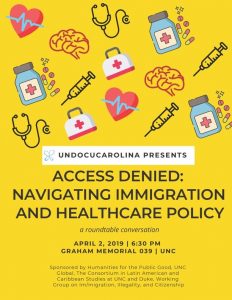 Featuring Dr. Milena Melo, Assistant Professor of Cultural Anthropology with a specialty in Medical Anthropology at Mississippi State University, Nnedinma Umeadi of the Chika Solidarity Committee, and Dr. Marco Aleman, Professor of Medicine at UNC.
Featuring Dr. Milena Melo, Assistant Professor of Cultural Anthropology with a specialty in Medical Anthropology at Mississippi State University, Nnedinma Umeadi of the Chika Solidarity Committee, and Dr. Marco Aleman, Professor of Medicine at UNC.
February 4th, 2019
The Role of Black Feminist Theory in Critiquing Scientific Practices and Concepts of Race
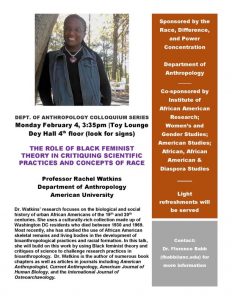 Dr. Rachel Watkins (Anthropology, American University)
Dr. Rachel Watkins (Anthropology, American University)
The Role of Black Feminist Theory in Critiquing Scientific Practices and Concepts of Race
Toy Lounge, Dey Hall 4th floor
Toward a Fugitive Anthropology
A Workshop Featuring Dr. Maya Berry
October 24, 2019
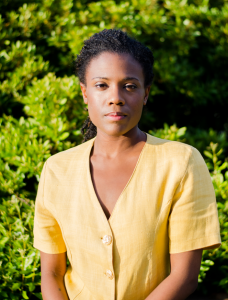 Graduate students and faculty affiliated with Anthropology; African, African American, & Diaspora Studies; Women’s and Gender Studies; and the Graduate Certificate in Participatory Research are invited to participate in an intimate research workshop on race, gender, and violence in the field. Drawing upon Dr. Berry’s co-authored 2017 article of the same name, in this conversation participants will examine how our gendered racial positionalities inflect the research process and consider how we can push activist methods to be accountable to the embodied aspects of conducting research.
Graduate students and faculty affiliated with Anthropology; African, African American, & Diaspora Studies; Women’s and Gender Studies; and the Graduate Certificate in Participatory Research are invited to participate in an intimate research workshop on race, gender, and violence in the field. Drawing upon Dr. Berry’s co-authored 2017 article of the same name, in this conversation participants will examine how our gendered racial positionalities inflect the research process and consider how we can push activist methods to be accountable to the embodied aspects of conducting research.
 Migration and Race: A Roundtable Discussion
Migration and Race: A Roundtable Discussion
January 29, 2018
An interdisciplinary group of scholars discusses the role of race in U.S. migration policy.
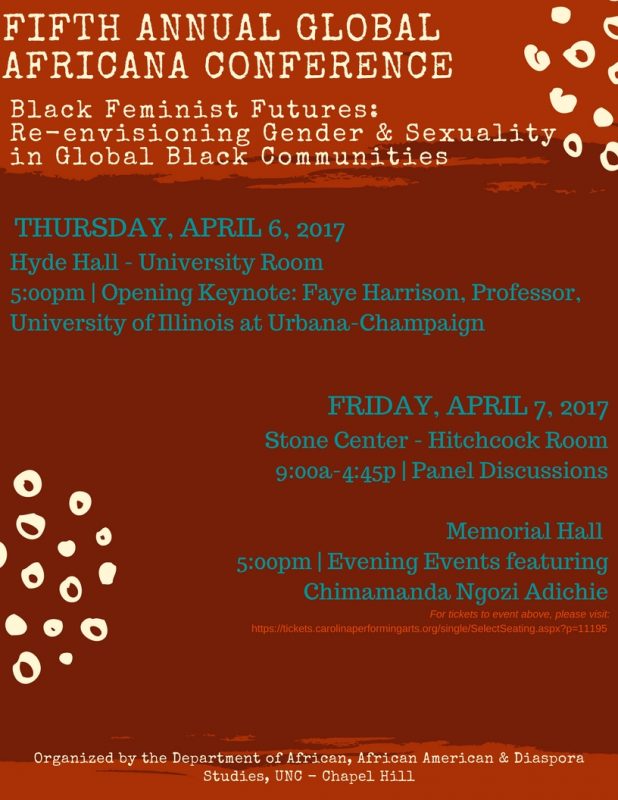 Fifth Annual Global Africana Conference
Fifth Annual Global Africana Conference
April 6-7, 2017
Black Feminist Futures: Re-Envisioning Gender and Sexuality in Global Black Communities
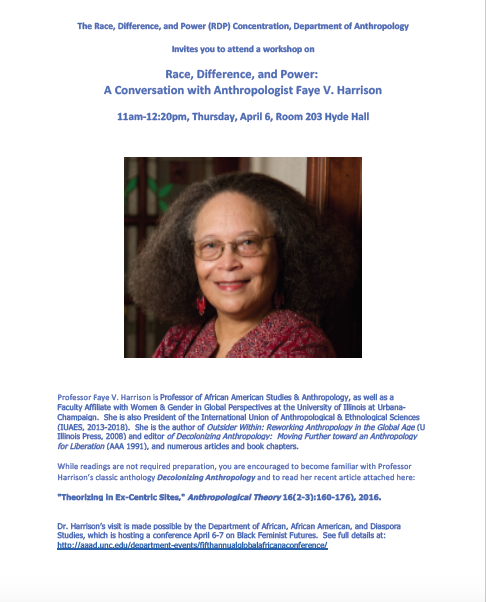 Race, Difference, and Power: A Conversation with Anthropologist Faye V. Harrison
Race, Difference, and Power: A Conversation with Anthropologist Faye V. Harrison
April 6, 2017
Professor Faye V. Harrison is Professor of African American Studies & Anthropology, as well as a Faculty Affiliate with Women & Gender in Global Perspectives at the University of Illinois at Urbana-Champaign. She is also President of the International Union of Anthropological & Ethnological Sciences (IUAES, 2013-2018). She is the author of Outsider Within: Reworking Anthropology in the Global Age (U Illinois Press, 2008) and editor of Decolonizing Anthropology: Moving Further toward an Anthropology for Liberation (AAA 1991), and numerous articles and book chapters.
 RDP Panel on Race
RDP Panel on Race
March 6, 2017
Anthropology graduate students Ampson Hagan, Anusha Hariharan, and Isaura Godinez teamed up with Dr. Karla Slocum and Dr. Charles Price to discuss their work on race, caste, ethnicity, identity, gender, place, being, migration, chronic disease, and history.
 Race Becomes Tomorrow: North Carolina and the Shadow of Civil Rights
Race Becomes Tomorrow: North Carolina and the Shadow of Civil Rights
March 2, 2017
A roundtable discussion with Dr. Gerald Sider who will discuss his research on racial identity and social justice in North Carolina.
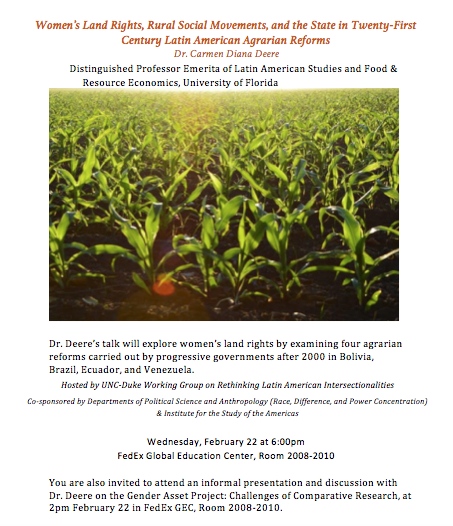 Women’s Land Rights, Rural Social Movements and the State in the Twenty-First Century Latin American Agrarian Reforms
Women’s Land Rights, Rural Social Movements and the State in the Twenty-First Century Latin American Agrarian Reforms
February 22, 2017
This lecture will address the disjuncture between Latin American women’s formal land rights and their attaining these in practice. Carmen Diana Deere will examine the four agrarian reform programs carried out by progressive governments after 2000 in Bolivia, Brazil, Ecuador, and Venezuela.
 Immigration and Refugee Policy in Crisis: Reflections For a New President
Immigration and Refugee Policy in Crisis: Reflections For a New President
February 18, 2017
Immigration and refugee policy has reached a global crisis. More people are compelled to cross borders than ever in our planet’s history. Meanwhile, the role of nations and states in providing for economic and political refugees is increasingly uncertain. Join us for a day of roundtable dialogue with researchers, community practitioners, and policymakers working on key topics of immigration policy reform and refugee resettlement and services. With opportunities for discussion among leading experts and breakout policy discussions that engage all audience participants, the event will explore what’s at stake in this time of transition as well as opportunities for setting new research and policymaking agendas.
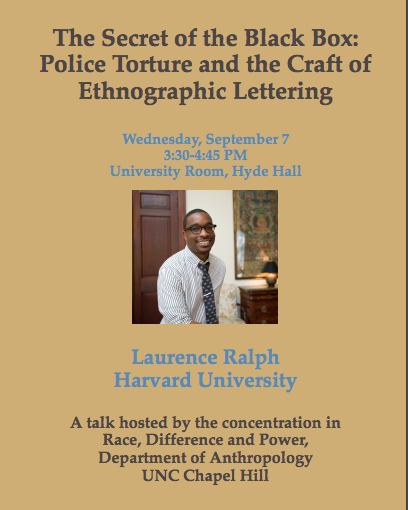 The Secret of the Black Box: Police Torture and the Craft of Ethnographic Lettering
The Secret of the Black Box: Police Torture and the Craft of Ethnographic Lettering
September 7, 2016
A talk by Professor Laurence Ralph
